Reviews
Iwashigumo
Mikio Naruse
Japan, 1958
Credits
Review by Ian Johnston
Posted on 28 November 2007
Source Wild Side DVD
Categories Flowing: The Films of Mikio Naruse
One of the consistent tropes of Naruse’s cinema is the tracking sequence - invariably broken down into multiple shots - that follows a couple as they walk and talk together. In Summer Clouds this occurs early on, as the peasant widow Yae and the city journalist Okawa take a walk together. At the start of the film Okawa first appears to be a narrative convenience, a means for Naruse - through Okawa’s interview with Yae - to raise a whole range of issues focused on the sociological changes taking place within Japanese rural society in the fifties.
But Yae and Okawa continue to spend time together, first when she takes him on her bicycle from the rural setting of her home into the nearby town of Atsugi; and then on this walk together Okawa explicitly offers Yae the possibility of changing her life. “For some time,” he says, as they walk along the seashore, “I’ve wanted to show you a wide open space like this so you can be stronger and happier.” Here, Naruse underlines this with visual symbolism. Up to this point, the background to their conversation has been the inland view, the land bulk that literally weighs down upon Yae’s life through her ties to the land, the need to support her son, and her oppression by her mother-in-law. Now suddenly, with this speech of Okawa’s, we are given a view of the other side, the wide expanse of sea and sky, and there’s an immediate sense of release, an opening up of the possibilities of life, a promise of freedom.
Yae is a great Naruse heroine and she’s certainly the character that guides the audience through the film—Summer Clouds opens and closes with her. But the film doesn’t stay solely with her. The story, full of narrative ellipses, is structured around a complex and initially confusing array of relatives from the same family. Yae herself is a war widow, bringing up her young son and living, in frustration and resentment, with her mother-in-law: she feels for the last 15 years she’s never existed as an individual.
A lot of screen time is spent on the family of her brother Watsuke. He’s played by Ganjiro Nakamura, who specialised in roles as ornery and idiosyncratic patriarchs (think of the troupe leader in Ozu’s Floating Weeds, or the randy elderly father in the same director’s The End of Summer), and Watsuke’s character is very much in this line.
Something of Watsuke’s earlier life is told to us second-hand in the early part of the film, and this has some thematic importance. This grand old patriarch was himself as a young man under the control of his own father who literally drove away his first two wives. Consequently, it takes a while to work out the precise background to the three sons that play significant roles in the story (there are also three other children). Hatsu, Shin, and Jun are the children, respectively, of Watsuke’s first, second, and third wives. And if these relationship complications weren’t enough, Michiko, the wife that’s found for Hatsu, turns out to be the stepdaughter from the second marriage of Hatsu’s own mother!
Watsuke’s three sons all represent challenges to his authority and reflect generational changes taking place even in rural society. In the early part of the film the second son, Shin, a bank employee who brings in an important contribution to the family budget, announces his decision to find a place for himself in town. Ultimately, this is the first step in the disintegration of Watsuke’s patriarchal family order and the assertion of independence on the part of all three of his adult sons.
Eldest son Hatsu is on the surface the most traditional of the sons—slightly older, he works on the farm and he happily enters into the arranged marriage being set up for him. But he’s soon working on circumventing his father’s plans for an elaborate and economically unviable marriage—in the end, by setting up house in town with his wife-to-be.
Toward the end of the film third son Jun also strikes out on his own path, irrespective of his father’s plans for him. (One of those plans involves marrying him off to his cousin Hamako in order to preserve some of the family land; although that plan has already been subverted by the growing relationship between Shin and Hamako in town). Jun decides to abandon the land in favour of a garage apprenticeship, and Naruse gives us an ironic intercutting of two scenes: first, of Watsuke’s self-satisfaction with the craftiness with which he gets around the land reform law by reserving a piece with his brother-in-law Dai on the promise of Dai’s daughter Hamako’s marriage to Jun; then, in a sardonic reversal on this central theme of the land, of Jun’s decision to study in Tokyo, entailing the selling off of a plot of land in order to pay for it.
There are contrasting scenes of the three brothers plotting the land sale on the one hand, and of Watsuke with his traditional identification with the land as the primary source for his own self-identity on the other. But Watsuke in the end is powerless to resist the forces of societal change as enacted through the very members of his family. He declares to Yae: “I will never let go, even if they conspire against me. As long as I’m alive, they’ll never get my land.” Yet, in the very next scene, we witness Watsuke in receipt of the money from the sale of the land.
Although so much time in the film is spent on the story (stories, rather) of Watsuke and his three adult sons, Yae remains the emotional core of Summer Clouds. She’s a woman who has been frustrated and repressed by her circumstances, and her affair with Okawa (along with the fortuitous absence of her mother-in-law) represents a new lease on life for her—physically/sexually, emotionally, and intellectually. We observe these changes in Yae or hear of them second-hand, changes that are both major and minor: her changed physical appearance, her newspaper writing, her taking up smoking, the driving lessons she starts. She shows herself as increasingly assured and even in control in her affair with Okawa, a contrast after the beautiful hesitancy that they both display on their first night together on the matchmaking visit. On a later occasion, when they retire to a room in her friend Chie’s restaurant, Yae makes the decided and dramatic gesture of closing the sliding window that Okawa has opened, the sign that they are to make love.
Yae’s childhood friend Chie offers an important parallel to Yae herself. One of the points made early on in the comparison of the two is how farming life has aged Yae so much more than Chie. In a sense, Chie offers a model for Yae of the possibility of a freer, more independent life for a woman of their background and generation—constrained and compromised, yes; but still with a measure of self-fulfilment. Chie is the mistress of an older married man who has financed her restaurant business, but she has had to accept the limitations imposed by their relationship, for example never being able to visit him when he is sick.
Here, Chie, though a minor character, is a typical Naruse heroine. Her acceptance is not the resignation of an Ozu character, a calm submission to mono no aware and the inevitable sadness of life. Instead with the Naruse heroine, and this is true of both Chie and Yae, there is an overwhelming sense of struggle against the pessimism that Naruse’s cinema finds in life.
“Do you think that the happiness we want is not normal?” Yae asks Chie at one point. Naruse’s answer doubtless is that the happiness is not normal, but the struggle to achieve it ought to be. This happiness is an ideal which may even be impossible to attain. Yae’s brother Watsuke tells her “If people were like you, doing what they want, it would be paradise on earth,” but Yae is far less free and independent than appears from the outside, certainly far less than her brother believes.
In fact, Yae’s pursuit of happiness and her own sense of self-identity is stillborn. What Summer Clouds shows is that the younger generation of Yae’s nieces and nephews can make the break with tradition and the past, but any changes that the generation of Yae and Chie makes are limited and compromised. For Yae, the ending of her romance with Okawa is the sign of how her idealistic drive to self-determination is brought to a halt. Driving lessons are abandoned; we can never know if her writing continues; and at the end Naruse stages for her a literal return to the land.
Unlike Hatsu and Michiko, Yae doesn’t turn up to farewell Okawa at the train station. Instead, Naruse ends Summer Clouds with a scene, heavy in symbolism, of Yae ploughing a field. Back and forth she goes, with Naruse giving us rhyming close ups of both the plough and Yae’s feet working their way forward through the muddy water of the paddy field. There’s a sense here of Yae’s stubborn determination to overcome resistance, a resilience to struggle and survive even if nothing truly changes for the better. Three times Yae turns in the field, as circumscribed an area as her own life; and when Naruse finally cuts to a wide shot of her moving through the field directly towards us and then concludes with one of a cloud-streaked summer sky, there’s a feeling of great emotional release. In spite of the essential pessimism of the ending, there’s no defeat here. This is a tribute to yet another Naruse heroine who keeps up the struggle in the face of all the tribulations life has for her.
More Flowing: The Films of Mikio Naruse
-
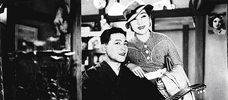
Wife! Be Like a Rose!
1935 -
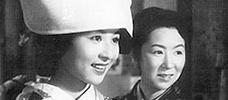
Mother
1952 -
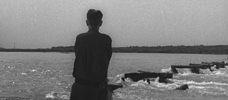
Older Brother, Younger Sister
1953 -
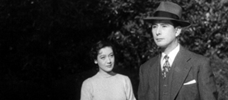
The Sound of the Mountain
1954 -

Floating Clouds
1955 -
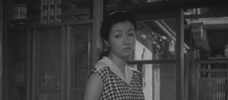
Flowing
1956 -
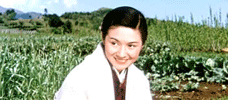
Summer Clouds
1958 -
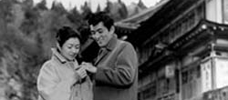
Yearning
1964 -
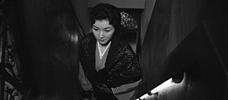
When a Woman Ascends the Stairs
1960 -
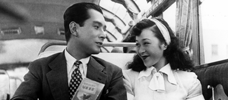
Repast
1951
We don’t do comments anymore, but you may contact us here or find us on Twitter or Facebook.



